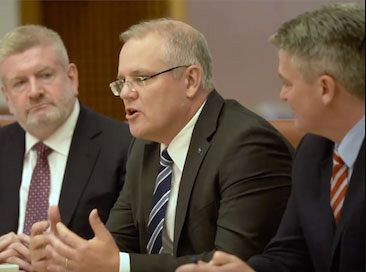Australia's economy is being poorly managed by the Turnbull Government and relief from this actual "debt and deficit disaster" is unlikely in the 2018 Budget, writes Alan Austin.
MORE NONSENSE is spouted by politicians and pundits during budget week than any other time of the year — outside elections, that is.
So we can expect fiddles, fudges, fakery and falsifications all this week. More than usual, if this budget launches an election campaign.
One of the most effective fudges by the Coalition and its serried ranks of protectors in the mainstream media is to ignore the global weather affecting Australia’s economy.
This is an ancient tradition in Australian conservatism. Donald Horne lamented in Death of the Lucky Country that not only did Australia’s media fail to report the travails of the Whitlam Government in the context of the devastating international banking crisis which followed the early 1970s oil shocks, it failed to report that crisis at all.
Nothing has changed regarding Australia’s contemptible media. But everything has changed in the global economy. The whole world is now in the strongest surge in investment, trade, employment, profits – and executive remuneration – since World War II.
How do we know? There are several indicators.
Record global commerce
One sound measure is export volumes, booming now in most countries.
There are 35 developed countries in the Organisation for Economic Cooperation and Development (OECD) — the club of rich, capitalist economies. Of these, 31 now have exports at, or close to, all-time records, including Australia. Only Chile, Finland, Iceland and Israel are missing the global trade Champagne party.
This is confirmed by the "Baltic Dry Index", a respected measure of trade vitality, based on prices of commodities shipped worldwide. From a low of 290 in February 2016, this has risen impressively, if erratically, over the last 28 months. It broke 500 index points in April 2016, then 1,000 last August. It is now at a robust 1,384.
Countries in budget surplus
Many well-managed economies are now in budget surplus and rapidly repaying the debt stacked on during the global financial crisis (GFC).
Of the 176 countries listed at tradingeconomics.com, 23 now have balanced or close to balanced budgets. Another 25 are in clear surplus (above 1% of GDP). Ten of these are in strong surplus (above 2% of GDP).
Of the 35 OECD countries, 14 are now in surplus, seven are in deficits at -1% of GDP or lower and just 14 still have significant budget deficits.
Government debt and other clues
All OECD members, except Norway, increased government debt substantially during the GFC. Most are now repaying that debt, some more rapidly than others. Only five poorly-managed countries increased their debt to GDP ratio in both calendar 2016 and 2017. They were Japan, France, Norway, Chile and Australia. France increased its debt to GDP by just 1.4%. The other four, including Australia, by 4% or more.
We could examine also global jobs, productivity and the value of the world’s stock exchanges. Clearly, an extraordinary global boom is well underway.
Australia lagging badly
Those individual economies being managed particularly well – or particularly badly – can be seen in the global rankings. These confirm that over the last four years Australia has been managed outstandingly poorly.
Back in 2013, only two OECD countries were in budget surplus – Norway and Luxembourg – with the majority of developed countries in deficits of -2.4% of GDP or deeper, some of them much deeper. Australia’s -1.2% deficit in 2013 ranked ninth in the OECD. Not bad for a small population a long way from major trading partners. The average deficit was -3.39%.
Australia posted a budget deficit of -1.9% of GDP in 2017, which ranked a dismal 26th out of those 35 countries. That was much deeper than the average of -0.71%.
Similarly, on debt to GDP, Australia’s ranking has tumbled from close to the top of the OECD in 2013 to ranking a dismal 13th today.
On jobs, Australia’s ranking has fallen from seventh in the world in 2013, to 17th today.
What to look for
For Australia to rank ninth again on the size of the surplus or deficit, this week’s budget would need to generate a surplus of 1.15% of GDP — or $5.2 billion. If that is delivered, the Coalition will have positioned Australia back where it was in 2013. If it is higher than $5.2 billion, the nation will have advanced.
If lower, it will have retreated. If the 2018 Budget is still in deficit, then Australia will remain in the minority ranks of the big loser economies.
What we will probably hear – from Coalition MPs and the mainstream media – will be comparisons of 2018 raw number outcomes with those of the Labor period, when the whole world was emerging from recession. Or, worse, comparisons with the last four years — when Australia completely missed the strong global upswing.
We shall soon know.
.@tanya_plibersek: 'Tonight's budget will have $80b worth of tax cuts to big businesses, $17b of that will go to the banks...and you can bet your bottom dollar there will be increases to executive pay packets too.'
— Sky News Australia (@SkyNewsAust) May 7, 2018
MORE: https://t.co/VwFo5sESkV #Budget2018 #FirstEdition pic.twitter.com/eflIfFcOvr
You can follow Alan Austin on Twitter @AlanAustin001.
 This work is licensed under a Creative Commons Attribution-NonCommercial-NoDerivs 3.0 Australia License
This work is licensed under a Creative Commons Attribution-NonCommercial-NoDerivs 3.0 Australia License
Support independent journalism Subscribe to IA.












